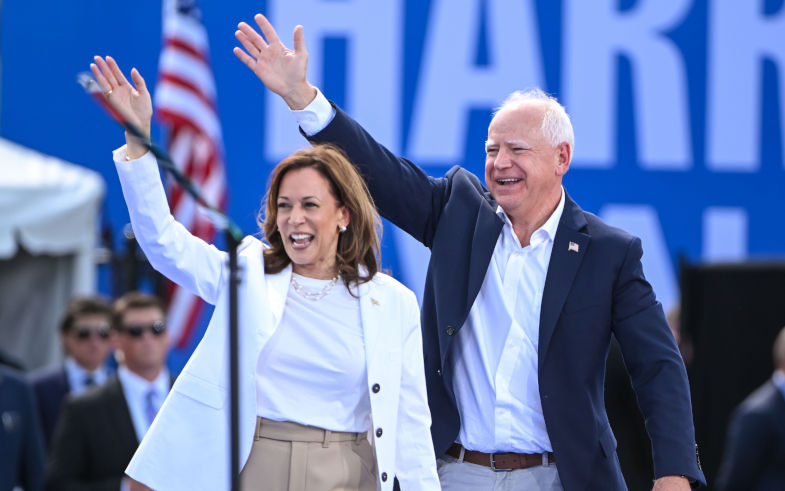Is there any chance the U.S. elections will lead to better relations with China?
August 12, 2024
Tim Walz has, for a vice-presidential nominee, unusual knowledge and close relationship with China. He has spoken against regarding China as an adversary.
Kamala Harris has just announced Minnesota Governor Tim Walz as her running-mate. We know that Biden was, if anything, even more anti-China than Trump and has made it clear on multiple occasions that he wants to block China’s rise for fear that it will disrupt the American number 1 spot in the global order. Many Chinese commentators prefer Trump to Harris believing Trump more unpredictable and more likely to change his mind than Harris, who is perceived as following Biden’s position. But Walz has a history of connection with China. Could this make a difference?, asks Colin Mackerras.
American politics has changed dramatically over the past few weeks. It could easily change again. Nobody knows how things will turn out or who will win in November. Here I just put down a few comments on how I see relations with China given the recent nominations of running mates, J.D. Vance for Trump and Tim Walz for Harris.
Vice-presidents are not usually that influential in formulating policy in the American system. However, they could have some impact in advice offered to the president.
Let’s begin with the Republicans. Upon nomination, Trump’s running mate J.D. Vance immediately said that China was the biggest threat to the United States. He said it was necessary to bring the war in Ukraine to a “rapid close” so that America could concentrate on “the real issue, which is China.”
He blames China for American economic decline and says China’s middle class must not be built on the backs of Americans. He dates American decline from 2001, when China joined the World Trade Organisation. There is no ambiguity in his view of China.
Meanwhile, Trump has promised far higher tariffs on commodities from China and other barriers to trade with China. He wants to strengthen even further the trade conflict with China he started back in January 2018. On the other hand, he seems to be less certain about U.S. military support for Taiwan in the unlikely but possible event that Beijing should retake the island by force.
For the Democrats, China policy could follow what we’ve seen over the last few years. But considering how old and doddery Biden is increasingly looking, I don’t think it’s impossible that some rethinking on China policy could take place. For a start, though Harris echoes Biden’s evaluation of Taiwan’s democracy, she has been less forthcoming than he about “rock-solid” military support for Taiwan should that involve war with China.
Walz has, for a vice-presidential nominee, unusual knowledge and close relationship with China. Here are a few items that make him look quite positive about China.
He has travelled to China some 30 times, even spending his honeymoon there. He taught American history and English at a high-school in Foshan, Guangdong Province, in 1989 and 1990. He loved and praised the students there, calling the Chinese kind, generous and capable. They were equally positive about him.
Jointly with his wife, Walz found a company called Educational Travel Adventures. Every summer from 1994 to 2003, it took high-school students to China and was apparently very successful. Many students recorded their appreciation and the impact it had created on their attitude towards China.
More important was his opposition to Trump’s trade war against China. In 2019, he attacked the tariffs Trump had imposed on items such as soybeans and pork. True, he was Governor of Minnesota, a major producer of soybeans, and the tariffs brought about a slump in exports to China. But he was very voluble in his opposition. He argued there was no alternative to Chinese purchases, meaning that Trump’s policy was actually more damaging to the U.S. than it was to China.
He’s dead right of course, but my point is that his statements were opposite to the policy fellow-Democrat Biden has been following as president. Certainly, the Republicans and their supporters have been loud in their criticism of his China activism. A Fox news host on 6 August even accused him of being groomed by Beijing to act as a spy for them.
Walz has always supported dialogue. He has spoken against regarding China as an adversary.
There are also major counter-signs. Walz has been actively involved in accusing China of human rights abuses in various contexts. He was vocal in criticising China for its policy on Hong Kong and was active in his support for the dissidents. As a member of Congress, he served from 2007 to 2018 on a congressional committee that monitored human rights and legal developments in China.
He has taken an active interest in Tibetan affairs and was part of a congressional delegation in 2015 led by Nancy Pelosi. He has also formed a good relationship with the Dalai Lama, describing a meeting with him in 2016 as “life-changing”. In 2016, he welcomed Lobsang Sangay, the leader of the government-in-exile, to his congressional office.
My personal reaction to what I’ve read about this man is that he is generally a good deal more knowledgeable and positive about China than most leaders in the United States. However, I think his attitude may have become less positive with the passage of time. That is not too different from the general drift of images of China in the West, and in particular the U.S. It is clear, however, that the Republicans are willing to attack him (and Harris) for his attitude.
It is highly doubtful that the U.S. election will lead to any major reset in policy towards China, or in Sino-U.S. relations. It seems as though the American establishment is determined to block China, whatever the cost. However, based on the above, there is far greater likelihood of change under a Harris-Walz Administration than under Trump-Vance.

